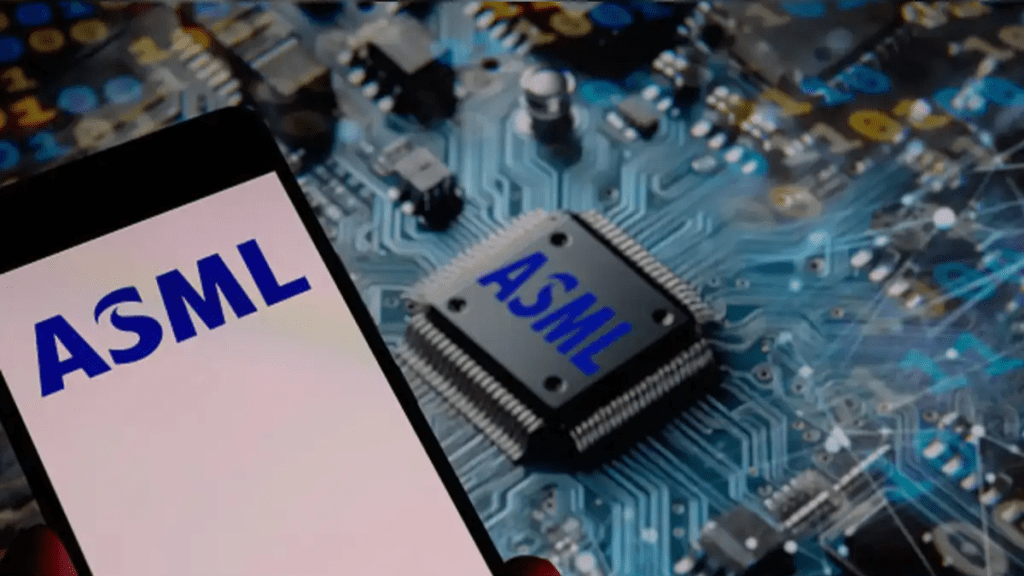Guys, let me start with a quick question. If I tell you the name “ASML,” how many of you have actually heard of it? Be honest. Probably not many, right? And that’s okay. ASML is not a household name like Apple or Samsung, but let me tell you—this company is like the wizard behind the curtain. Without it, the entire global chip industry would come to a stop.
And now, here’s the exciting part: ASML is looking at India. Yes, India! Which makes you wonder—could this be the big turning point for us in the global semiconductor game? Let’s break it down in simple words.
Who on Earth is ASML?
First, let me explain who they are. ASML is a Dutch company. Their speciality? They make these giant, insanely complicated machines called EUV lithography machines. Don’t get scared by the jargon—I’ll explain.
Basically, if you want to make the world’s most advanced computer chips, you need an EUV machine. And guess what? ASML is the only company on the planet that makes them. Only one! Imagine if only one bakery in the entire world could make wedding cakes. That’s how rare and important ASML is.
Without their machines, companies like Intel, Samsung, and TSMC simply can’t produce the most powerful chips. So yeah, they’re a really big deal.
Why Is India Entering the Picture Now?
So why is ASML suddenly showing interest in India? The answer is simple: the global chip game is shifting.
Think about what’s happening right now. The U.S. doesn’t want to depend on Taiwan and China for everything. Europe wants its own chip production. India, on the other hand, is pushing hard with the “Make in India” program and offering big incentives for semiconductor manufacturing.
ASML sees this as an opportunity. If India is serious about building its chip industry, ASML wants to be part of that journey. Recently, reports came out that ASML is in talks with Indian officials and universities about collaborations.
What Could This Mean for India?
If this partnership actually happens, guys, it could be huge. Let me give you a picture. Right now, India is mostly known for software, IT services, and startups. We’re the brains behind a lot of coding and tech support worldwide. But when it comes to hardware—especially chips—we’re lagging behind.
Now, imagine if India becomes a hub not just for writing code but also for building the physical brains of devices. That would completely change the game. It means:
- More high-paying jobs in engineering and manufacturing.
- Opportunities for students in electronics and nanotech.
- Less dependence on importing chips from other countries.
- And most importantly, it would put India on the global tech map in a new way.
But Wait, It’s Not That Easy
Now, I don’t want to oversell this. It’s not like ASML will set up shop in India tomorrow and we’ll start rolling out chips next week. Making semiconductors is one of the hardest things on the planet.
You need:
- Cleanrooms that are literally 10,000 times cleaner than a hospital.
- Water supply in massive amounts.
- Skilled manpower who know the tiniest details of chipmaking.
- Billions of dollars in investment.
So yeah, it’s a long road. But the fact that ASML is even looking at India? That itself is a signal. It means the world is starting to take us seriously in this space.
Why Does ASML Care?
You might wonder, “Okay, but why does ASML even need India?” Good question.
Well, ASML machines are insanely complex—like 100,000 parts complex. They need global support, research, and collaboration. By working with India, ASML can tap into our talent pool—engineers, researchers, and maybe even local suppliers in the future.
Plus, India gives them access to a huge market. We’re not just consumers of electronics; we’re slowly becoming producers. And ASML knows it’s better to be early in the game than late.
India’s Big Dream
To be honest, India has been dreaming of being a chip powerhouse for a long time. We’ve had announcements, MOUs, government incentives—but progress has been slow. The entry of a giant like ASML could be the push we need.
Think of it like cricket. India had talent for years, but when foreign coaches and IPL money came in, things really took off. Similarly, India has the brains, but now we need the right partnerships to move from “potential” to “performance.”
What’s in It for You and Me?
Now, you might ask, “Okay, but why should I care if ASML comes to India?” Fair point. Here’s why:
- If India makes chips locally, gadgets could become cheaper and more easily available.
- Startups in AI, robotics, and electronics will have better access to hardware.
- More jobs in engineering, manufacturing, and even support industries.
- And, of course, it makes India stronger on the global stage.
So yes, even if you’re not directly in this field, the ripple effects will touch your life.
Wrapping It Up
So, to sum it up, ASML is like the secret key holder of the chip world. The fact that they’re talking to India is a big deal. It doesn’t mean we’ll become the next Taiwan overnight, but it does mean we’re finally entering the conversation.
If this works out, India could move from being just the world’s IT back office to being one of the world’s hardware leaders. And honestly, that’s the kind of leap we’ve been waiting for.
So next time you hear “ASML” in the news, don’t skip it. Because that strange-sounding Dutch company might just play a role in shaping India’s future in technology.
I’m Srini – a tech junkie who loves exploring the latest in gadgets, apps, and science. I enjoy sharing my thoughts on tech news and discoveries in a simple, friendly way. For me, technology is not just about updates, it’s about how it connects to our daily lives. Through this blog, I want to make tech fun and easy to understand for everyone.
